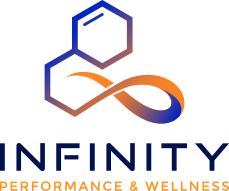Contact Infinity Performance & Health
Have questions or want to learn more about our personalized approach to healthcare? Get in touch with our team today!

Questions About your services?
Ready to take the first step towards better health? Sign up now to begin your journey with us. Fill out the form to schedule your initial consultation or to learn more about our services. Our team will be in touch shortly to get you started on the path to optimal wellness. Let’s embark on this journey together!
EMAIL US:
ADDRESS:

Frequently Asked Questions
Estrogen Managment Men
Irritability, sexual dysfunction, breast tenderness, bloating, insomnia, increased body fat.
No. Many patients use TRT and the estrogen level may rise, however if it is within a healthy range no medication is needed. A healthy estrogen level is needed!
The body normally converts testosterone into estradiol (estrogen) through a process called aromatization. When you supplement extra testosterone more aromatization will occur causing increase in estradiol. Aromatase inhibitors block this conversion keeping estradiol levels stable.
Testicular Preservation
The testicles are responsible for testosterone production. When you supplement external testosterone such as a medication, the brain and testicles communicate and read that there is sufficient testosterone in the blood. This causes testicular function to slow down, in turn decreasing size/atrophy as well.
Medications such as HCG as well as clomiphene may be used to increase fertility and testicular function which in turn increases the size of the testicles
No. If you are not planning on conceiving a child while on therapy or the aesthetic look of testicular size is not a concern for you, you do not have to take any further medication.
Sex drive is often driven by testosterone. If atrophy is caused by supplementing TRT you will likely not have any decrease in sex drive if anything an increase is expected.
Mens Sexual Performance
After consulting your provider, they will recommend mediations that can help with achieving erections and maintaining them like vardenafil, sildenafil or tadalafil. Other medications such as oxytocin and PT 141 can be used for arousal and sensitivity during sexual intercourse.
Vardenafil is often much more rapid acting possibly shorter lasting. Sildenafil is a medium onset and time sustaining erection. Tadalafil is a slower onset but longer acting medication that can be taken as needed or daily which helps achieve and maintain erection for spontaneous sexual activity.
Yes. Erections lasting longer than 4 hours are called a priapism and should be evaluated in the emergency department. Those also taking Nitrates such as nitroglycerin for their heart should not be taking these medications.
Hair Loss Prevention in Men
While you are receiving testosterone therapy it is possible to have some thinning of hair throughout the head or just the scalp line. This is often in men who are very susceptible to hair loss or current thinning of hair. This occurs due to an increase in a hormone called DHT which binds to the hair follicle weakening it and causing it to fall out.
There are topical and oral medications that can be used. Minoxidil is a topical solution or foam that is placed on the scalp and rubbed in to stimulate hair growth by causing the hair follicles to stay in the growth cycle.
Finasteride and Dulasteride are DHT blockers that help maintain the strength of the hair follicles
Yes, depending on the desired effect and your medical history it is fine to use both medications.
Blood Pressure
HRT, specifically testosterone, should not directly increase your blood pressure. It actually has vasodilatory effects which can decrease your blood pressure. Blood pressure usually becomes elevated if your red blood cells increase causing thickening of your blood.
High blood pressure can cause widespread damage to the blood vessels of the heart, kidneys, liver, brain, eyes and throughout your extremities. It increases your risk of heart attack and stroke. It can also cause heart failure.
Often high blood pressure is a “silent killer” meaning there can be no symptoms.
Common symptoms can be headaches, chest pressure, dizziness, fatigue
Advanced Lipid and Cholesterol Managment
Although there is a phenomenon that is more prevalent in men then women, while using testosterone there can be in increase in your cholesterol or decrease in HDL (heart healthy cholesterol). There is no definitive reason or causation for this effect but when it occurs it is important to manage do decrease any health risks.
Having high cholesterol or low heart healthy cholesterol increases your risk for atherosclerosis (plaque on the inside of your blood vessels) and heart disease and or high blood pressure. These risks together can cause heart attacks or strokes.
Although this is mostly dependent on lifestyle and family genetics, both men’s and women’s risks increase as we get older. Women tend to have a slightly more increased risk of heart disease over men as they enter menopause.
Can you take supplements that are more natural vs Prescription medications for elevated cholesterol?
Yes. Depending on your healthcare providers advice you may use over the counter supplements prior to prescription medication if needed.
No. You need a healthcare provider to evaluate your cholesterol panel accurately to determine if your cholesterol panel carries a high risk of heart disease.
Thyroid management
Weight gain, fatigue, feeling cold, hair changes, skin changes.
Weight loss, sweating, hot flashes, palpitations, bulging eyes, headaches, insomnia.
Thyroid function is heavily influenced by genetics and family history. Hereditary thyroid conditions are often noted more in women.
Hormone Replacement Therapy in Women - Estrogen and Progesterone
As soon as you enter menopause and do not have any contradicting health factors, you may start at any age.
Women who have a history of ovarian or breast cancer, stroke, blood clot or who are current smokers do not qualify.
There are numerous changes when entering menopause. Women often have a change in vaginal comfort, hot flashes, night sweats, irritability, as well as changes in hair and skin.
Only if you have had your ovaries removed as well and your lab work displaying menopausal levels.
Progesterone is predominantly used for uterine protection against cancer while using supplemental estrogen. It can also be used for vasomotor symptoms of menopause such as hot flashes or night sweats and aids in sleep.
Hormone Replacement Therapy in Women – Testosterone
It helps control vasomotor symptoms of Hot flashes and night sweats. It can aid in mood changes, insomnia, fatigue and increased libido.
No. The dosage used to achieve benefits from symptoms will increase your testosterone level but still below any male limit.
Pills, troche, injection or cream.
As always, with use of any medication brings the possibility of side effects. During a consultation with our healthcare providers, you will be heavily educated on these and how we aim to control or prevent them.
Hair Loss Prevention for Women
If you are receiving testosterone therapy it is possible to have some thinning of hair throughout the head or just the scalp line. This is often in women who are very suseptible to hair loss or current thinning of hair. This occurs due to an increase in a hormone called DHT which binds to the hair follicle weakening it and causing it to fall out.
There are topical and oral medications that can be used. Minoxidil is a topical solution or foam that is placed on the scalp and rubbed in to stimulate hair growth by causing the hair follicles to stay in the growth cycle.
Finasteride and Dulasteride are DHT blockers that help maintain the strength of the hair follicles.
Yes, depending on the desired effect and your medical history it is fine to use both medications.
BP/Cholesterol for women
HRT, specifically testosterone, should not directly increase your blood pressure. It actually has vasodilatory effects which can decrease your blood pressure. Blood pressure usually becomes elevated if your red blood cells increase causing thickening of your blood.
High blood pressure can cause widespread damage to the blood vessels of the heart, kidneys, liver, brain, eyes and throughout your extremities. It increases your risk of heart attack and stroke. It can also cause heart failure.
Often high blood pressure is a “silent killer” meaning there can be no symptoms.
Common symptoms can be headaches, chest pressure, dizziness, fatigue
